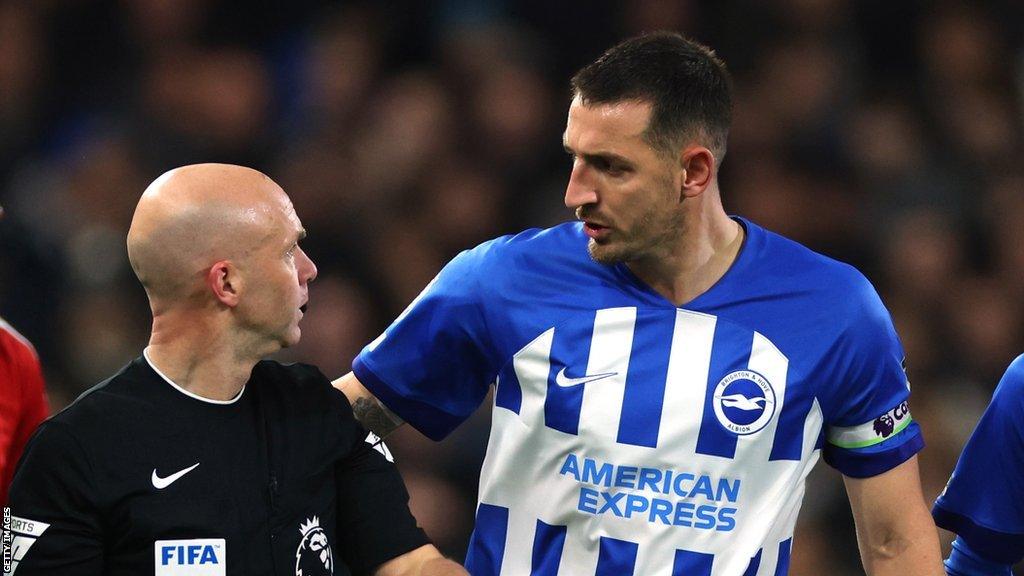Bookings for dissent up by 88% as officials attempt to curb misbehaviour
- Published

Lewis Dunk (right) was initially booked by referee Anthony Taylor but then said something else to the official, who immediately brandished a red card
The number of bookings for dissent in the men's and women's professional game has increased by 88% as officials clamp down on player and manager behaviour.
There have been 1,813 bookings for dissent so far in 2023-24 compared with 966 at the same stage last season.
In the Premier League, the number has more than trebled from 24 to 80.
In the same period, there has been a decrease in charges for technical area misconduct, surrounding referees and mass confrontation.
It takes in matches from the start of the season up to Sunday, 3 December in the Premier League, English Football League (EFL), Women's Super League (WSL), Women's Championship and the National League System (Steps 1-4).
"We were empowered and supported by the game to be more robust with our actions to address declining behaviour," said chief refereeing officer at referees' body PGMOL, Howard Webb.
"A culture change won't happen overnight and it is early days, but we are moving in the right direction and our officials are successfully delivering on our part of the collective football effort to reset behaviours, protect the reputation and promote the positive image of the game for the next generations."
The leagues joined the Football Association (FA), League Managers Association and Professional Footballers' Association at the start of the season to launch the 'participant charter', external, which included tougher punishments for dissent and other bad behaviour such as time wasting.
The clampdown has resulted in a:
37% decrease in charges for surrounding of a match official (from 19 to 12)
43% decrease in charges for mass confrontations (from 61 to 35)
10% decrease in charges for technical area misconduct (from 70 to 63)
The FA issued more than 20 fines to Premier League clubs last season for surrounding match officials or mass confrontations, totalling more than £1m.
There have been just two charges for the same offences so far this season, compared to 14 at the same stage of the last campaign.
"Professional football sets an example to those who play and watch the game at all levels so it is encouraging to see this approach has already had a positive impact on our game," said Premier League chief executive Richard Masters.
EFL chief executive Trevor Birch said: "Without match officials, we have no game at all, so it is imperative the game does all it can to support them so that they can do the job to the best of their ability."
There was some criticism of the changes at the start of the season, with Manchester United defender Raphael Varane saying the players' concerns were "not being heard"..
In November, Brighton defender Lewis Dunk served a two-match ban after being shown a straight red card for abusing referee Anthony Taylor.
Dunk was the first player to be sent off for abusing an official while on the pitch during a game since Alan Smith for Newcastle United against Manchester United in January 2008.
Arsenal left-back Takehiro Tomiyasu was booked for taking too long over a throw-in against Crystal Palace in August and was later shown a second yellow card for a foul.
The opening weekend of the WSL in October saw six yellow cards for causing delays to play, including Manchester City defender Alex Greenwood being shown a second yellow card for taking 26 seconds to restart play with a free-kick.

Our coverage of your Premier League club is bigger and better than ever before - follow your team and sign up for notifications in the BBC Sport app to make sure you never miss a moment.
